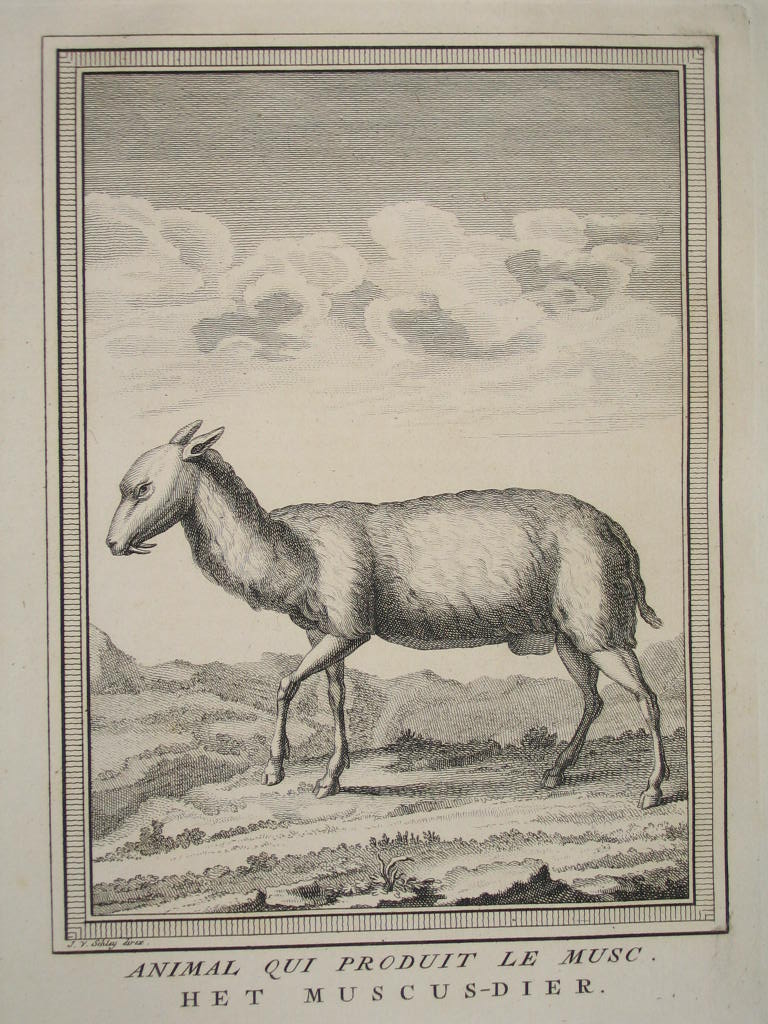FWP:
SETS == WORDPLAY
ABOUT THE MUSK-DEER: There is a species of Central Asian 'musk deer', the adult
males of which have an external scent gland with very strong aromatic powers
that make it valuable for use in perfumes (*wikipedia*,
*National
Geographic*). The gland isn't in the deer's navel, or even connected to
the navel in any way. But the ghazal world has its own rules
of anatomy and physiology, which override the arrangements of mere ordinary
nature. The 'navel' might only refer, after all, to the 'middle' of the deer
in question; being too literal-minded about the real world gets us nowhere
in the world of the ghazal. There's also the word nāfah , obviously derived from nāf , that refers to a 'musk-pouch',
presumably one on the animal's body. For more examples of musk-deer imagery,
see {95,1}; {228,1} // {282x,4}; {380x,1}.
This verse clearly expresses reverence for Hazrat 'Ali. But since many Sunni Muslims feel such reverence, the verse doesn't suffice to mark Ghalib formally as a Shi'a. Ghalib himself always sought to avoid not only sectarian controversy, but sectarian labels as well. Russell and Islam provide (pp. 32-38) a thoughtful discussion of the available evidence of his religious attitudes as they developed over time.
In proper mushairah-verse style, the first line appears merely perplexing until we are allowed to hear the second. For after all, either as a newborn baby, or as an adult idol-breaker, Hazrat 'Ali surely never walked on the covering of the Ka'abah. So why would it be either 'musky' or 'dark' (see the definition above of mushkīñ ) from his footsteps?
In the second line, we learn that 'it'-- unspecified-- is the navel of the earth, not the navel of a deer. What is the 'it'? Grammatically, it ought most directly to be the covering/veil [libās] of the Ka'bah, but that reading gives rise to major problems: the mere covering is surely not the 'navel of the earth'-- after all, it's changed every year. So we are led to take the 'it' to be the Ka'bah itself.
If we take 'it' to be the Ka'bah itself, then we learn that the Ka'bah is the navel of the earth, not the navel of a deer. It is the navel of the earth apparently because there is a ḥadīṡ to this effect, as Nazm points out; and also because it is musky-dark [mushkīñ] like earth (and like musk). And it is the navel of the earth, rather than the navel of a deer, because it (along with its covering) is made into a powerful perfume-source by means of the footsteps of Hazrat 'Ali, rather than merely by means of the musky scent-gland of a deer.
As a handy example of such literal-mindedness, Nazm himself becomes surprisingly exercised over the problem of the 'navel of the earth'; he seems to equate this with the North Pole, and energetically argues that long ago Mecca could perfectly well have been in the polar region. And yet it's not hard to see how the Ka'abah could be viewed as the (religious) 'center' of the earth, and thus referred to as the earth's 'navel'.
Without being at all literal-minded, however-- in fact, just
because we are not literal-minded in naturalistic terms-- we can expect precision
of structure, especially from a poet like Ghalib. And in this verse we don't
really find it. The need to slide constantly back and forth in our minds between
the qualities of the Ka'bah itself, and those of its covering, is disconcerting.
It's also not attractive to have to compare the footsteps of Hazrat 'Ali to
the scent-gland of a deer. All this makes the verse feel rather slippery.
Its connections seem slapdash,
and there's really not much going on in it. Perhaps its charm is meant to
lie in its devotional tone, rather than in its literary subtlety.

Nazm:
To call the Ka'bah the 'navel of the earth' is the theme of an anecdote about the Prophet [ḥadīṡ], and by 'navel of the earth' is meant 'middle/center of the earth'. But the objection is made, that how can it be the center/pole of the earth [which is far to the north]? A possible answer to this is that first of all, very few anecdotes about the Prophet are such that they have been proved to be absolutely accurate and correctly recorded.
And if we accept it, then consider: the people of Europe, who have sifted through every bit of dust and investigated historical conditions, have reported this astonishing thing: that in the northern regions, where ice and cold are extreme, many bones are found of animals who live in hot lands, and can't ever survive outside the tropics. This gives us great reason to suppose that at some time this region was in the tropics; and where now snow falls, the loo used to blow. From which it follows very clearly that when the northern regions were in the tropics, then Arabia must certainly have been at the pole. (152)
== Nazm page 151; Nazm page 152